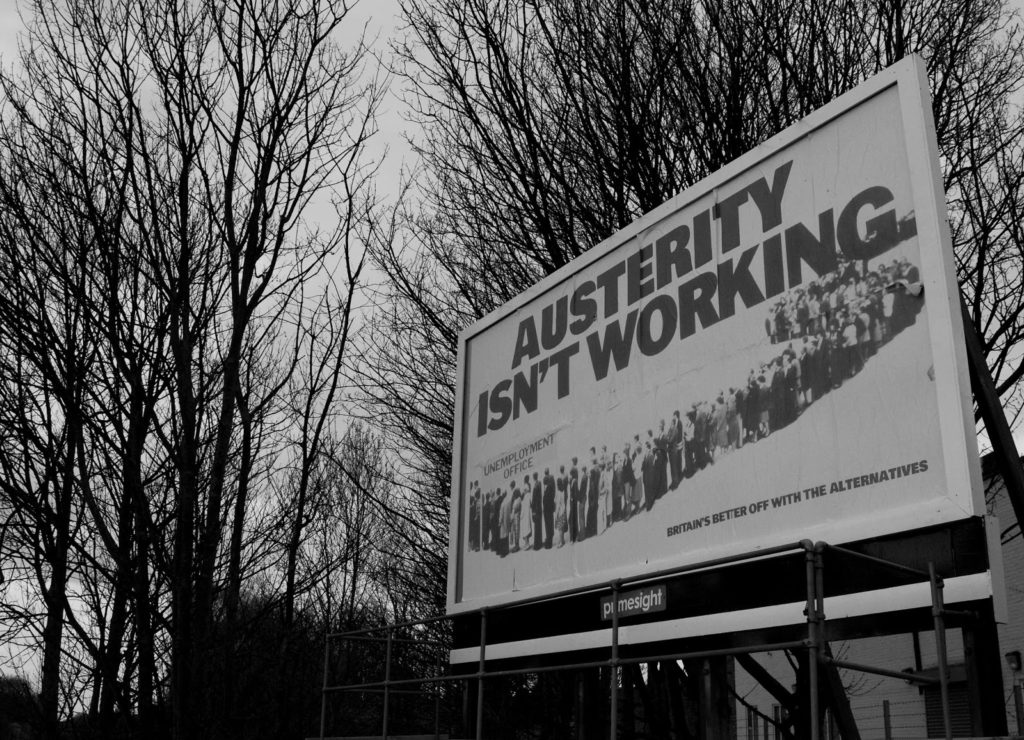Angela Merkel is not only one of Germany’s longest serving chancellors – next to Konrad Adenauer and Helmut Kohl – but also the country’s first female chancellor and arguably the world’s most powerful woman. And yet, one could say that she is far from being a symbol of female empowerment. Rather than challenging patriarchal structures, she fits into them while power positions and influence remain difficult if not impossible to reach for most other women, and the austerity policies continued or introduced by Merkel’s government are, to a great extent, placed on the shoulders of women, thus counteracting progress in the field of gender equality.
European austerity
The European Women’s Lobby (EWL) warned in a 2012 report that European austerity policies are an infringement on women’s rights and gender equality since they lead to a perpetuation of existing and a creation of new inequalities . In 2017, the then shadow equalities minister Sarah Champion (Labour) presented number showing that, since 2010, 86% of the burden of austerity policies had been placed on women’s shoulders. And while Theresa May claimed the Conservative party to be a stronger advocate for gender equality having produced the country’s only two female prime ministers, Mary-Ann Stephenson (co-director of the Women’s Budget Group) pointed out: “The chancellor’s [Philip Hammond] decision to continue with the decisions of his predecessor to cut social security for these low income families, at the same time as cutting taxes, is effectively a transfer from the purses of poorer women into the wallets of richer men.”

In Germany, austerity measures that prevailed in Europe after the 2008 financial crisis had already been implemented as of 2002. The neo-liberal reforms of the Agenda 2010, introduced by the Social Democrat/ Green party government preceding Merkel’s successive Christian Democrat-led governments that continued these austerity policies, increased the German economy’s resilience and competitiveness allowing Germany to recover quickly from the 2008 crisis. Yet, Oxfam highlights that at this policy approach shifted “the balance of power between capital and labour considerably in favour of capital.” It is a shift that comes at a high social cost, particularly for women and especially for those belonging to minority or marginalised groups.
Economy and human rights
Be it employment, the care and health system or general women’s rights, women are particularly affected by austerity measures. Not only are men’s jobs usually prioritised over women’s employment, but cuts in public sector job lead to women being more affected than men as women constituted by far more than half of public sector employees. Women are thus increasingly pushed into precarious employment situations with very low wages and little or no social security or protection of workers’ rights.
At the same time, women are forced to fill the gaps created by the state in the care and health system by cuts to public spending. As state funded care work decreases, especially in an aging society, care is reprivatized, and traditional gender roles are reinforced. Once occupied with unpaid care work, these women have less time for paid employment, free time activities and political engagement. On top, women’s voices are further marginalised by destroying gender equality institutions in stride with austerity measures that pose a struggle to organisations ranging from advocacy groups to service providers such as organisations supporting survivors of violence.

Yet, while austerity policies are a stumbling block in the way of the advancement of women’s rights and gender equality, as well as creating general economic imbalances within the Eurozone, among others the German government under Merkel’s lead holds on to their aim of a balanced budget. The social consequences of this goal will continue to be a burden that is dumped on women, especially single mothers, young women, women with disabilities, older women, migrant and refugee women, LGBTQI+ women, women belonging to ethnic, religious and linguistic minorities, women in rural areas and those who live in poverty or extreme poverty.
“Discriminatory economic policies cannot be justified on the basis of the need to achieve macro-economic target and without regard to the human rights of women and gender equality”, Juan Pablo Boholavsky, and independent expert on foreign debt and human rights, argued in a report to the UN General Assembly. In a 2018 report, the OHCHR recommends a series of measures to improve gender equality. Among others the report called on governments to recognise unpaid care and domestic work as valuable work, invest in public services such as care services to redistribute care and domestic work “not just from women to men but from individuals to families to state-funded provisions”, and to strengthen women’s working rights and social security through targeted policies.
To be continued…
While the number of female leaders is growing, austerity policies – particularly when implemented by one of these female leaders such as German chancellor Merkel – highlight feminist, journalist and author Susan Faludi’s statement: “You can’t change the world for women by simply inserting female faces at the top of an unchanged system of social and economic power.” This is not to say, that no progress is being made – in Germany where reforms were undertaken introducing i.e. paid parental leave for fathers as well as mothers, or elsewhere. However, the gender pay gap, female under-representation in positions in politics as well as in business and austerity policies standing in the way of gender equality continue to be a considerable social issue.
by Merle Emrich
Photo Credits
Hands Fingers, Karl-Heinz Gutmann
Austerity isn’t working, wandererwandering, CC BY 2.0
Stew and Sympathy, Neil Moralee, CC BY-NC-ND 2.0










